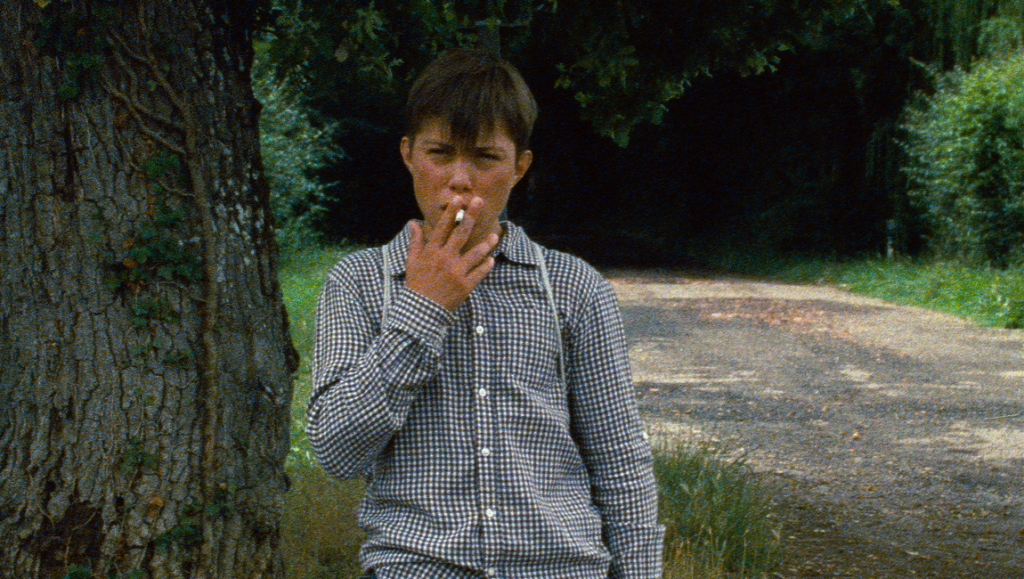David Depesseville’s debut feature, Astrakan, is a film that is at once deeply humanist and utterly pitiless. Essentially a character study, the film depicts the precarious and often horrifying world of Samuel (Mirko Gianinni), a young boy in the French foster-care system who is placed in an unloving home in rural Morvan. While such a plot could easily give way to uncomplicated victimology, Depesseville takes a radically different approach. Withholding key information and avoiding expository context, Astrakan throws the viewer — along with Samuel — into an alien, incomprehensible world of danger, distrust, and isolation.
We don’t know very much about Samuel at first. It’s only through the seemingly inexplicable way that his adoptive parents regard him that we discover that he is a new, and not altogether welcome, part of his family. Marie (Jehnny Beth) and Clément (Bastien Bouillon) do not provide Samuel with his own clothing, instead giving him hand-me-downs from their older son, Alexis (Nathaël Bertrand). The couple berates Samuel, showing no sympathy for the trauma he’s experienced. (We learn that his father was killed by the police; the circumstances of his mother’s absence remain unexplained.) Marie and Clément mainly are in it for the state subsidy that Samuel brings in as a foster child in their care — so they work only to create the outward impression of good parenting, such as paying for gymnastics lessons and sending Samuel on a school ski trip (while the rest of the family vacations elsewhere).
Depesseville almost never deviates from Samuel’s point of view here, and while the boy’s situation might be that of an abused orphan, his demeanor suggests otherwise. He is emotionally closed off, only occasionally daring to trust his caregivers. In fact, he goes so far as to withhold his feces, resulting in his continual soiling of his underwear. Marie screams at him for this, as it costs money to replace the dirty underwear. Clément, meanwhile, humiliates him for clogging their plumbing. Rather than seeking counseling for Samuel, the couple takes him to a supernatural seer, who tries to read the boy’s mind by waving his hands around his head.
Depesseville’s style and sensibility both exhibit the social concern and empathy of the Dardenne brothers, but also the animalistic worldview of Bruno Dumont. The society around Samuel is brutal and perverse, with a sexually precocious neighbor (Lorine Delin) coaxing Samuel to disrobe but crying assault when the two are caught. And Samuel is well aware that Marie’s brother, Luc (Théo Costa-Marini), is a child molester, but knows all too well that in this family, his word would mean nothing.
Shot in 16mm Kodak, Astrakan is lush, its images alive with swirling film grain. Depesseville depicts rural life with a convincing, seductive facade of the bucolic. But Samuel’s enforced distance from the family allows him to see the cruelty and rot that others willfully ignore. After employing a relatively straightforward (if stilted) realism for most of its run time, Astrakan ends with an operatic montage of Samuel’s inner life, a harrowing return of the repressed. In its stark ambiguity, this conclusion ensures that we can never quite know what will become of Samuel. The horrors he has experienced will travel with him into the larger world, but his future, Depesseville implies, is still an open question.
DIRECTOR: David Depesseville; CAST: Mirko Giannini, Jehnny Beth, Bastien Bouillon; DISTIRBUTOR: Altered Innocence; IN THEATERS/STREAMING: September 1; RUNTIME: 1 hr. 45 min.
Originally published as part of InRO Weekly — Volume 1, Issue 14.


Comments are closed.